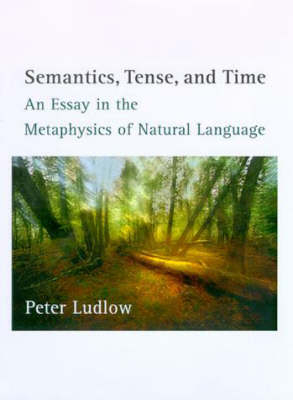
Semantics, Tense and Time
An Essay in the Metaphysics of Natural Language
Seiten
1999
MIT Press (Verlag)
978-0-262-12219-1 (ISBN)
MIT Press (Verlag)
978-0-262-12219-1 (ISBN)
- Keine Verlagsinformationen verfügbar
- Artikel merken
This text suggests there is a close relation between the structure of natural language and reality, and one can gain insights into metaphysical questions by studying the semantics of natural language. Using the metaphysics of time as a case study, it focuses on the dispute about the nature of time.
According to Peter Ludlow, there is a very close relation between the structure of natural language and that of reality, and one can gain insights into long-standing metaphysical questions by studying the semantics of natural language. In this book Ludlow uses the metaphysics of time as a case study and focuses on the dispute between A-theorists and B-theorists about the nature of time. According to B-theorists, there is no genuine change, but a permanent sequence of events ordered by an earlier-than/later-than relation. According to the version of the A-theory adopted by Ludlow (a position sometimes called "presentism"), there are no past or future events or times; what makes something past or future is how the world stands right now.Ludlow argues that each metaphysical picture is tied to a particular semantical theory of tense and that the dispute can be adjudicated on semantical grounds. A presentism-compatible semantics, he claims, is superior to a B-theory semantics in a number of respects, including its abilities to handle the indexical nature of temporal discourse and to account for facts about language acquisition.
Along the way, Ludlow develops a conception of "E-type" temporal anaphora that can account for both temporal anaphora and complex tenses without reference to past and future events. His view has philosophical consequences for theories of logic, self-knowledge, and memory. As for linguistic consequences, Ludlow suggests that the very idea of grammatical tense may have to be dispensed with and replaced with some combination of aspect, modality, and evidentiality.
According to Peter Ludlow, there is a very close relation between the structure of natural language and that of reality, and one can gain insights into long-standing metaphysical questions by studying the semantics of natural language. In this book Ludlow uses the metaphysics of time as a case study and focuses on the dispute between A-theorists and B-theorists about the nature of time. According to B-theorists, there is no genuine change, but a permanent sequence of events ordered by an earlier-than/later-than relation. According to the version of the A-theory adopted by Ludlow (a position sometimes called "presentism"), there are no past or future events or times; what makes something past or future is how the world stands right now.Ludlow argues that each metaphysical picture is tied to a particular semantical theory of tense and that the dispute can be adjudicated on semantical grounds. A presentism-compatible semantics, he claims, is superior to a B-theory semantics in a number of respects, including its abilities to handle the indexical nature of temporal discourse and to account for facts about language acquisition.
Along the way, Ludlow develops a conception of "E-type" temporal anaphora that can account for both temporal anaphora and complex tenses without reference to past and future events. His view has philosophical consequences for theories of logic, self-knowledge, and memory. As for linguistic consequences, Ludlow suggests that the very idea of grammatical tense may have to be dispensed with and replaced with some combination of aspect, modality, and evidentiality.
Peter Ludlow, Professor of Philosophy at the University of Toronto, is the author of Semantics, Tense, and Time: An Essay in the Metaphysics of Natural Language (MIT Press, 1999), among other books, and the editor of Crypto Anarchy, Cyberstates, and Pirate Utopias (MIT Press, 2001) and High Noon on the Electronic Frontier (MIT Press, 1996).
| Erscheint lt. Verlag | 8.10.1999 |
|---|---|
| Reihe/Serie | Bradford Books |
| Verlagsort | Cambridge, Mass. |
| Sprache | englisch |
| Maße | 160 x 229 mm |
| Gewicht | 590 g |
| Themenwelt | Geisteswissenschaften ► Philosophie ► Erkenntnistheorie / Wissenschaftstheorie |
| Geisteswissenschaften ► Philosophie ► Sprachphilosophie | |
| Geisteswissenschaften ► Sprach- / Literaturwissenschaft ► Sprachwissenschaft | |
| ISBN-10 | 0-262-12219-7 / 0262122197 |
| ISBN-13 | 978-0-262-12219-1 / 9780262122191 |
| Zustand | Neuware |
| Haben Sie eine Frage zum Produkt? |
Mehr entdecken
aus dem Bereich
aus dem Bereich
die Grundlegung der modernen Philosophie
Buch | Softcover (2023)
C.H.Beck (Verlag)
CHF 25,20
Buch | Softcover (2023)
Reclam, Philipp (Verlag)
CHF 9,80


![Was heißt Denken?. Vorlesung Wintersemester 1951/52. [Was bedeutet das alles?] - Martin Heidegger](/media/113619842)